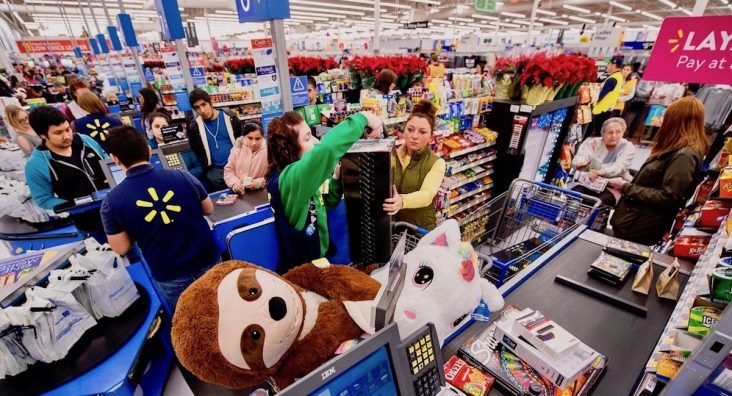Tariffs not yet hurting holiday spending
by December 3, 2019 5:08 pm 263 views

(photo courtesy of Walmart Inc.)
Consumers are not letting tariffs or other economic fears put a damper on their holiday spending this year, according to Jack Kleinhenz, chief economist for the National Retail Federation (NRF).
“We know that consumers are out and have already been shopping. That’s a good indicator,” Kleinhenz said in a recent NRF blog post.
He said many retailers pre-bought inventory for their stores last year, well ahead of the next expected tariff increase on Dec. 15. Kleinhenz said consumers will likely see few if any price increases passed onto them this holiday season.
“We will not likely see prices increase until spring 2020, assuming the Dec. 15 tariff increase goes into effect,” he added.
The trade group said its position is based on what its retail customers shared months ago regarding sales and margins exceptions for Black Friday which were locked into place over the summer with maximum margins. The National Retail Federation expects Americans will spend $730 billion this holiday season which runs from Nov. 1 to Dec 31. That breaks down to $1,047.83 per person.
Charles O’Shea, an analyst with Moody’s, said the early prospects look good for holiday 2019, but it’s a marathon and not a sprint. He said the preliminary data from online sales is quite positive throughout the Thanksgiving holiday weekend with gains above 20% across the industry.
O’Shea said even though sales results are encouraging, he will wait until income reports roll in to decide just how profitable the season is for retailers and suppliers. He said early reports of weakness in-store traffic though the holiday was not a sunrise and more consumers are quite comfortable ordering from their couches.
“Retailers are finally understanding it does not matter where the transaction takes place, they just want the sale. Those retailers who offer the broadest assortments and provide true omnichannel experiences have a competitive advantage,” O’Shea said.
The majority of retail analysts are upbeat with holiday projections and believe retail is far from dead, but it is taking on new forms. Robby Ohmes, with Bank of America, said retailers must leverage their digital footprints by reaching online customers and use stores to build brand awareness and bring in customers who might not have shopped there otherwise. Ohmes said Costco, Walmart and Target stand to benefit the most from this year’s holiday shopping because of their large omnichannel presence and investments in one-day shipping to better compete with Amazon.
Kleinhenz said consumers may be less optimistic about the economy, but that is unlikely to stop their holiday spending because they are better prepared to handle a financial downturn.
The Institute for Social Research at the University of Michigan reports the household debt as a percent of income is much lower than before the Great Recession. The Federal Research Bank of St Louis reports Americans on average are saving a little more than 8% of their income, which is higher than rates in recent years.
“Consumers are going to have a merry Christmas, but consumers have upped their savings because like firms they understand that this expansion can’t last forever,” said Richard Curtin, a research associate at the University of Michigan.
Curtin said strong holiday sales could also give an extra boost to the economy leading into 2020.
However, fewer shoppers this year — 31% — plan to spend the same or more this holiday season, down 4 percentage points from last year, according to research from consulting firm AlixPartners that was published by Retail Dive. Fewer say their financial health is better than 12 months ago, and fewer believe the economy is improving, according to the research.
Tariffs threaten to dampen holiday spending further. A fifth of the consumers with holiday budgets that are smaller this year say that if tariffs boost prices more than 10% they’d forgo a purchase, the firm found.
